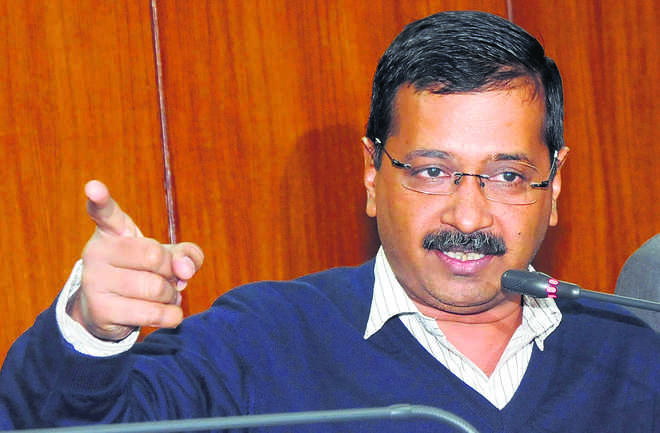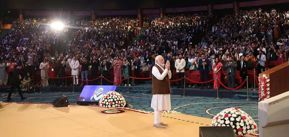
Fascinating: Within Delhi, Kejriwal is impressive, but outside, he loses his magic.
Shiv Visvanathan
Academic Associated with Compost Heap
Arvind Kejriwal is a strange figure in Indian politics. He has about him a protean look, which takes one to moral heights, but the next moment, he sounds pedestrian, banal like a clerk fumbling in a government corridor. A friend of mine, an acute and unforgiving observer of politics, once said, "He is the only man who can turn an epic drama into a limerick in five minutes." Earlier, I felt the charge was harsh but now more and more, one senses the truth of it.
Kejriwal still fascinates. Within Delhi, he is impressive. Some of the work his party has done around medicine and education, of involving migrants within the rhythm of the city is worth voting for.
But Kejriwal loses his magic outside Delhi. An editor of a leading journal once told me, "He treats Delhi like a mohalla, an adda, and it works. He conveys the sense of the human and the humane. But Kejriwal, like the Greek mythical hero, loses power the minute he moves beyond the ground of Delhi. The minute AAP as a party stretches out or crosses the state border into Punjab, Rajasthan or Haryana, he becomes inane. From a proactive leader, he turns supplicant. From a seasoned politician, he becomes a babe in the woods.
Kejriwal's behaviour over the last week has been illustrative of this. The Chief Minister was in Thana Kalan village in Haryana to give BSF hero Narendra Singh's family a cheque. While answering questions from the press, Kejriwal stated that he was ready to make an alliance with Dushyant Chautala and his father Ajay. He said that Ajay had a clean image and that he held him in high esteem.
At one level, the statement looks innocuous. One can even dismiss it as an act of fishing in troubled waters as fabled Chautala family members battle it out against one another amid overwhelming charges of corruption. The question one must ask when Kejriwal uses the word clean is whether does he mean new or is he seriously considering parts of the Chautala clan as politically pure.
The comment sounds surreal. Here is a man who made his reputation by talking of transparency, honesty and fighting the dragons of corruption in politics. Yet, in an almost Orwellian way, he seems to suggest that some corrupt politicians are cleaner than the others. Ajay Chautala has been implicated in the job scam. Job scam as a scandal is to the Chautalas what the fodder scam is to Lalu Prasad. It embodied both their control and competition when in power. And yet, here is Kejriwal, like Alice in Wonderland, claiming words will mean what he says. Has Kejriwal become naïve or innocent or is he playing in the murky waters of Haryana politics? Is he merely taunting Khattar for ignoring his pleas over the stubble-burning controversy?
It is clear that AAP knows that it cannot be an island within the stormy waters of BJP politics. Yet, it is also clear that AAP does not have a strategy for expanding its base beyond Delhi. One feels disappointed. Here was a man who along with Anna Hazare virtually said politics was the art of the impossible. Yet, a few years later, this man now confesses that politics is the art of the possible and that the possible is limited.
Kejriwal is running around looking for allies in electoral politics. He seems to forget that his strength and inspiration came from the civil society and the way he inspired idealists to join politics. He was a man who had constructed a hyphen between the effervescence of political movements, their ability to pick big issues and the stability of a political party seeking competence in governance. He has lost that vision of inspiring possibilities. He is looking only into the cupboard of opposition politics, a non-Congress, non-BJP world. He does not realise that the cupboard is bare. The rattles he hears are empty statements, not the promise of a new politics.
How does one look at Kejriwal's offer? Does one dismiss it as a straw in the wind to be forgotten as a stray thought in the hustle and bustle of everyday politics? One can even dismiss it at the level of strategy by saying Kejriwal loses his touch when he enters Haryana and Punjab. He could have done wonders about the drug menace in Punjab, but lacked the guts and the imagination to follow it up.
Oddly, it is not what Kejriwal says about Haryana or Punjab or even about Kamal Hassan's new party that one has to focus on. In fact, in the last case, Kejriwal was presented by the media as the icing on Hassan's cake, a message that Kamal could do in Chennai, what AAP did in Delhi. Sadly, Kamal Hassan is like an actor without a script. His politics is almost absent-minded.
However, it is not tactics or strategy that we have to examine. A psychologist offered me a different hypothesis, he called it impishly "the limits of goodness theory". He added, he borrowed the idea not from psychological classics but from Bollywood narratives. He claimed that in a Bollywood film, like an Amitabh Bachchan classic, good people die before the interval. The good cop, the honest teacher, the moral father is eliminated by the villain. Bollywood argues that mere goodness is almost incompetent. It needs the power of heroic violence to fight evil.
Kejriwal, the psychologist argued, was the Bollywood exception: the good politician who had survived after the interval and established himself as a major figure in Indian politics. He went beyond the cameo role to become a perennial figure in politics. Goodness can survive in the right ecology. But my friend did not stop there. He claimed that there was a strange twist in the tale.
He referred to psychologist Otto Rank. Rank invented the idea of the double, where a good character creates a second figure, an evil one who haunts him. Most persons have doubles, another grey side which disfigures them.
Kejriwal too has a double, but this double operates outside Delhi. The double becomes alive as soon as Kejriwal crosses the borders. As he enters Haryana, Rajasthan or Punjab Kejriwal moves from idealism to instrumentalism, from a democratic idea of politics to a pragmatic, tactical one. Kejriwal would have disowned the Chautalas in Delhi, compared them to the Congress family of the past. But his scenario outside is different. He is fishing for opportunities, forgetting his own ideals. This Kejriwal-II is like any other politician, full of hypocrisy and double-talk, waiting to grab a bit of power.
Sadly, the early Kejriwal had powerful critics. Today, his opponents look like him. When he offers a hand to the Chautalas, the media reports it blandly. The sadness begins there. The story lies in the taming of Arvind Kejriwal. His goodness may not last the entire film. Politics has banalised another idealist.



























